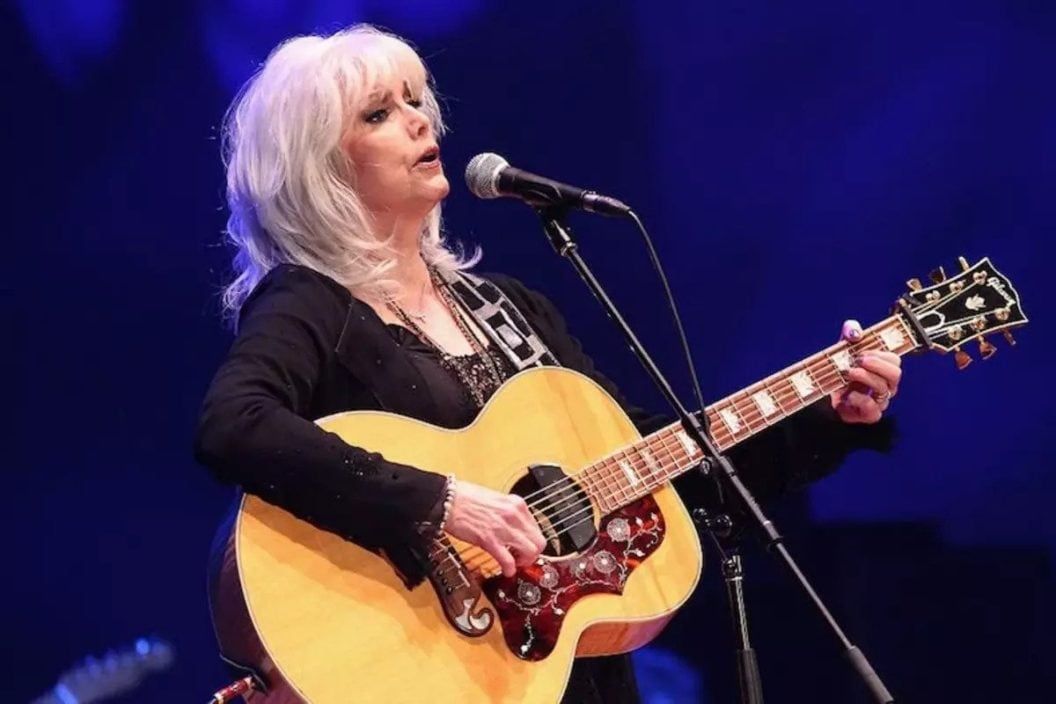
A lullaby for grown hearts—Emmylou Harris sings a promise so quiet in “A Love That Will Never Grow Old” that you feel it more than you hear it.
Let’s set the anchors before we drift into memory. “A Love That Will Never Grow Old” was written for Brokeback Mountain—music by Gustavo Santaolalla, lyrics by Bernie Taupin—and recorded by Emmylou Harris for the film’s official soundtrack on Verve Forecast (2005). On the album it sits early—track 4, running a spare 3:20–3:21—and it went on to win the Golden Globe for Best Original Song in January 2006, the signature trophy attached to this understated hymn. It wasn’t spun off as a chart-hunting single; its life is inside the movie and on the soundtrack album.
A small but telling point of history: the song became the subject of awards-season folklore when it was ruled ineligible for the Academy Awards—not for quality, but for insufficient screen time under the Academy’s rules at the time. The Golden Globe stood; the Oscar ballot didn’t open. That odd wrinkle has followed the song ever since, and it fits the music’s temperament: something precious that passes through quietly, leaving a deeper afterglow than fanfare ever could.
If you want to place the scene precisely, the film’s cue sheet does it for you. Harris’s performance is heard as Jack drives away from Ennis, heading south toward Mexico—not over the final credits, which belong first to Willie Nelson’s aching “He Was a Friend of Mine” and then Rufus Wainwright’s “The Maker Makes.” That choice matters. The song enters not as an epilogue, but as part of the story’s motion: love carried forward, even as two men drift apart under a sky that won’t always be kind.
The sound on tape is all hushed craft. Santaolalla—who composed and produced the picture’s music—keeps the frame bare and breathable. His guitars move like light across a wooden floor; there’s a faint Hammond presence and a whisper of pedal steel; the fiddle brushes the melody’s edge; and Harris sings from just behind the beat, the grain in her voice turning the lyric into lived experience rather than ornament. These are not guesses; the album credits name the hands in the room on this track: Santaolalla’s guitars, Bob Bernstein’s pedal steel, Gabe Witcher’s fiddle, with Aníbal Kerpel on bass and Hammond. The restraint is the point. You don’t notice the arranging until you notice you’re breathing more slowly.
There’s a gentleness to the backstory that suits older ears. Santaolalla—fresh from a run of intimate, acoustic-leaning film scores—found in Bernie Taupin a lyricist willing to write small truths instead of declarations. The words avoid purple poetry; they choose home language. Harris carries those lines without theatrics, the way you talk to someone you trust when the house is quiet and the day has finally sat down. In a film where love is both sanctuary and wound, the song refuses both bitterness and sentimentality. It simply believes—in the dignity of affection, in the hope that tenderness can outlast weather.
For those who first heard it in a dark theater, the meaning arrived all at once: this is a lullaby for people who have already lived. The title could read like a fairy tale; Harris makes it read like a vow. The melody doesn’t strain for uplift; it settles. That’s why the track continues to work as the years gather. It recognizes that love—the kind that keeps its promises—rarely shouts. It shows up, stays kind, and holds still long enough for the heart to quiet down. In the world of Brokeback Mountain, that quiet is radical. In our own rooms, it’s recognizable as grace.
The song’s afterlife is woven into the soundtrack’s broader story. Santaolalla’s music for the film won the Academy Award for Original Score, and the album became one of those modern soundtracks people play without the picture because the atmosphere itself feels like company: pedal steel like far hills, slow tempos that leave space to remember, guest voices (Nelson, Wainwright, Steve Earle) that keep the world human-sized. Inside that circle, “A Love That Will Never Grow Old” stands as the set’s moral center: a three-minute assurance that tenderness can be durable, even when circumstances are not.
Spin it now—on the original CD, on a streaming service, or simply in memory—and notice how the room changes by the first chorus. No grand bridge, no key-change heroics, just a steady heartbeat and a voice that has carried country songs across decades speaking softly enough to be heard forever. Awards and eligibility footnotes will keep their place in the margins, but the reason the song lasts is simpler. Emmylou Harris sings as if she’s setting a lamp in a window for someone who might yet come home. The lamp is small. The light is warm. And the promise—a love that will never grow old—feels, for once, like something the world might let us keep.